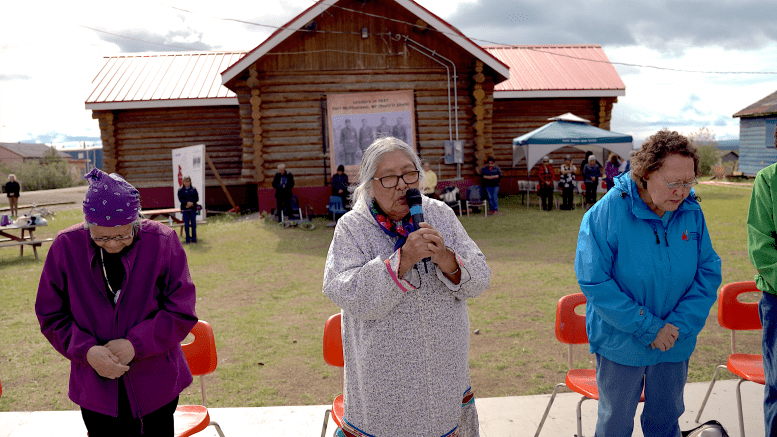A hundred years have passed since the four headmen of Fort McPherson signed Treaty 11.
Residents gathered over the weekend to celebrate what that day means to them as Gwich’in people.
The community honoured former Chiefs Julius Salu, Johnny Kyikavichik (Kay), Abraham Francis and Andrew Kunnizzie for their commitment to protecting culture, lands and self-determination.
Grand Chief of the Gwich’in Tribal Council Ken Kyikavichik was in attendance to honour his late grandfather, Johnny.
“It’s with very mixed feelings that we look at this date,” he admits, “We still face a number of issues in our communities.”
The document promised education and healthcare, but due to colonization many of those promises were broken.
“We always interpreted the treaty to mean that our way of life would continue,” he says.
Many believe the document to be lost in its translation as it was originally understood to secure peace and friendship between nations.
“We don’t look at the written text in the treaty, we look at the verbal understanding,” says Kyikavicik.
The community views the document as a testament to the Gwich’in as distinct peoples in Canada.
“We still remember,” Kyikavichik says.
“We’re still here, gathered eating our traditional foods, fiddling, singing, enjoying each other’s company.”
That’s what’s important to remember, he says.
Wanda Pascal is the Chief of Teetl’it Zheh and she’s proud to celebrate this day with her community.
“What we never forget is who we are,” she says, “we’re standing behind the leaders when they signed this treaty.”
She says she owes the success and livelihood of the Gwich’in people to those same four Elders and thanks them for their strong leadership.
“They made sure that our land wasn’t going to be taken away.”
Even the four granddaughters of those same leaders spoke on what having their ancestors sign, all those years ago, means to them.
Thanks, grandpa
Elder Sarah Taya, granddaughter of former Chief Julius, is the last of her family line.
“My grandfather was a really powerful man. I appreciate what he’s done for the people by signing the treaty,” she says.
Taya remembers the kind of man Chief Julius Salu was outside of band and council.
She told personal stories of her childhood and her journey as a woman.
She remembers how much her grandfather loved playing with the children in the community, he’d buy tons of candy out of town only to watch the kids jump with excitement as he shared it.
Salu was an advocate for the youth and their education.
Taya calls on her community to attend meetings and get more involved, as well.
“So you young people, look after your education and really go after it,” she says.
Elder Joanne Snowshoe says she was nine when she met the former chief.
She remembers him as the ultimate family man.
Snowshoe echoes the importance of education both on and off the land.
Chief Pascal says she hopes the youth in her community learn from this occasion and look to the Elders for answers on the history of their people.
Northerners came from all over, even Dawson City, to be a part of the celebrations.
On the last day, the community participated in a re-enactment of the signing, going so far as to even distribute cash allowances to residents.





